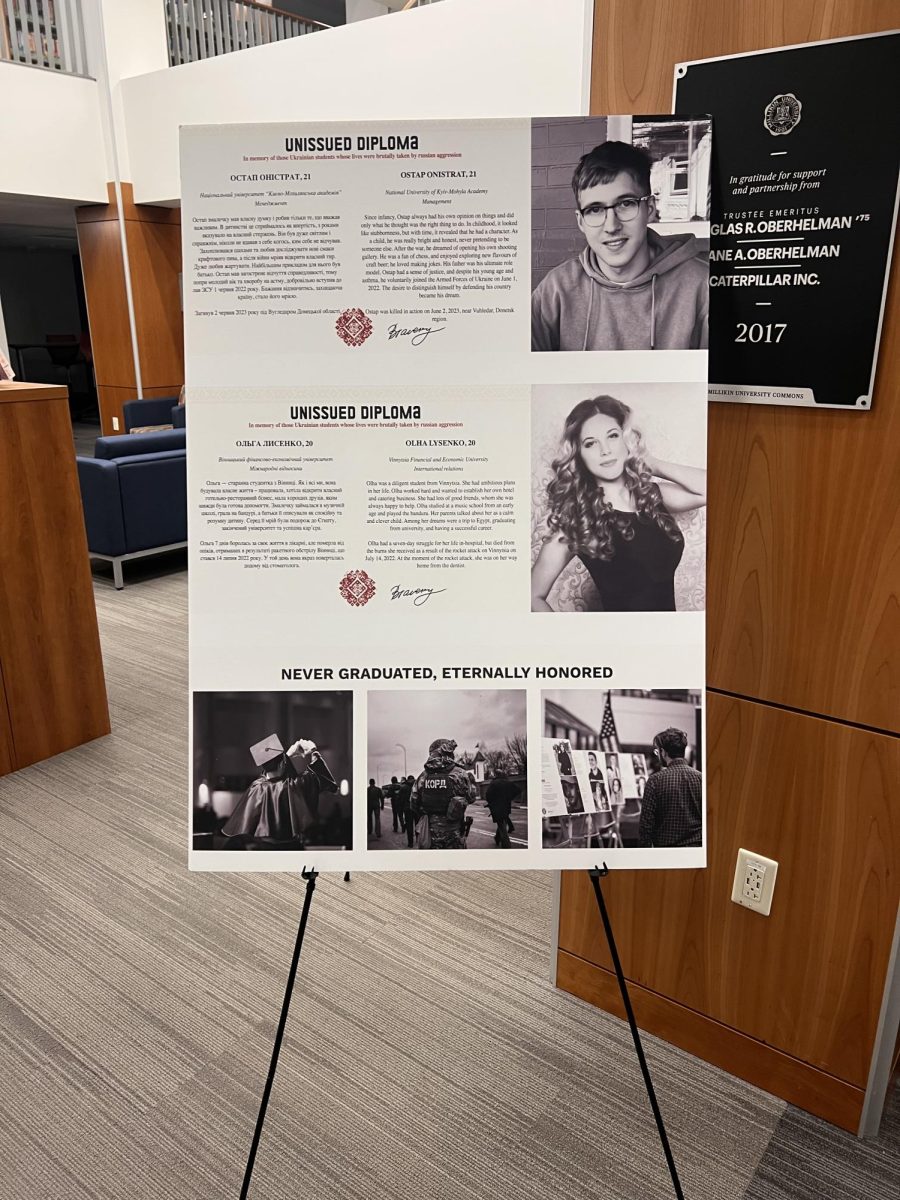The Unissued Diplomas exhibition serves as a reminder that the war in Ukraine has cost much more than diplomas. It has cost irreplaceable lives.
The project was created in 2023. Its goal is to bring attention to the war in Ukraine while honoring students who will never receive a diploma due to their tragic and untimely death caused by the Russian invasion.
The Unissued Diplomas’ mission statement reads, “It is our honor to spread the life stories of the courageous students who would still be here if it wasn’t for the Russian invasion. We believe in taking action when the freedom of our country is at stake.”
The exhibition features a wide range of 40 stories of Ukrainian students, some of whom were as young as 17 when they were killed. It is a worldwide initiative that has been held in 24 countries.
“It gives us this perspective on the war that is really all-encompassing,” Laura Dean, Associate Professor of Political Science at Millikin, said. “It’s not just affecting men; women and children are also getting killed. Being able to tell their stories is an important point, and their memory hopefully can live on and make an impact.”
Dean was responsible for getting the exhibition onto Millikin’s campus due to her affiliation with the Russian, East European, and Eurasian Center at the University of Illinois. She attended a protest to acknowledge the third year of the war in Ukraine, and the exhibition was displayed there at the time.
“I was talking to the people, and they were like, ‘Would you want to bring this to Millikin?’ and I said, ‘Yeah, that sounds amazing.’” Dean said. “They basically mounted all the stories for us and even gave me the tripod. They made it really easy for me.”
Dean studied in Ukraine for some time and resonated with the stories. She discovered that one of the Ukrainians killed was attending the same university she was. Another was studying a similar discipline to her own.
“I hope that people three years on realize that it’s a war that’s still happening,” Dean said. “There are students and people their age who might have taken time away from university to go and fight and try to defend their country.”
The exhibition raised concern not only for the lives being lost but also for the very nature of the conflict itself. The display caused some reflection on the United States’ role in the war and the current foreign relations between the United States, Ukraine, and Russia.
“Throughout the ages, America created itself as the pinnacle of freedom,” Michael Jouanneau, a Millikin student originally from Ukraine, said. “The people in the current administration who are enacting our foreign policy disregard our role as leaders in freedom and democracy while being willing to negotiate directly with tyrants and dictators.”
Jouanneau studies political science, so he has a special interest in current affairs. He is particularly invested in the Ukrainian and Russian conflict because he was born in Ukraine but immigrated with his family to the United States when he was around one year old.
“[The United States has] been on their side since their independence in 1991 under the dissolution of the Soviet Union, where we were one of their biggest allies,” Jouanneau said. “We helped them rebuild and become a transitional democracy. [Ukraine is] a democracy, and America has helped [them] become that. Now, just throwing us out in the mud and rain is a disgrace.”
This exhibition comes at a time that has been fraught with controversy due to tense negotiations between Ukraine and Russia. The display serves as a reminder of the sacrifices that have been made to ensure continued Ukrainian independence. Jouanneau warns of the potential danger of Ukrainian land concessions.
“If we give up Eastern Ukraine to the Russians, where is he going to stop next?” Jouanneau said. “Latvia? Lithuania? Estonia? Is he going to annex Belarus? What about the Caucasus, Georgia, or Azerbaijan? What’s going to happen to all these other territories and states that have a critical history with the Russian state?”
The installation at Millikin was displayed in the University Commons on the first floor of the Staley Library. It consisted of large posters on tripods that would tell the story of the students. The story text had dual language translations in Ukrainian and English side-by-side.
“I hope they reflect on how grateful our students are to live in a peaceful country and have the ability to walk across the stage and get their diploma on graduation,” Dean said.
The display was available from April 29 to May 9. The exhibition is only a small snapshot of the mass destruction and destroyed lives the war has cost. There are countless other stories that are yet to be told, but each one bears the commonality of a life taken too soon.
“Throughout Biden’s administration and definitely this current administration, we’ve noticed that they’re very reluctant to actually [aid] or [confront] this invasion and [say] what it actually is, which is a violation of international law and order as prescribed by the UN conventions,” Jouanneau said. “We need to talk about the Ukrainian stories because people are dying, and that is a loss for our future.”
For more information on the Unissued Diplomas initiative, visit their webpage at https://www.unissueddiplomas.org/. To read additional Ukrainian stories, visit https://www.victims.memorial/, the database Unissued Diplomas, used to find their stories.
“These are real people who are basically like you and I, who went to university. They grew up, had a childhood, and, by an act out of their control, were forced to cut their education short,” Jouanneau said.


